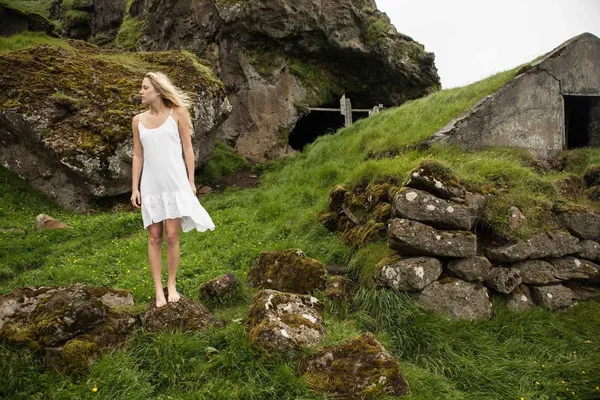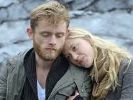Eye For Film >> Movies >> Bokeh (2017) Film Review
Bokeh
Reviewed by: Jennie Kermode

The notion of people finding themselves suddenly alone in the world is an old one in science fiction cinema. It's a very low budget way to make a film: all you need to do is find a couple of actors who're willing to get up very early in the morning. Bokeh echoes The Quiet Earth in its central mystery, but in focus it has more in common with Tom Large's ambiguous apocalyptic drama Beyond. As the title suggests, it's not really the subject that's important, but how we interpret what's going on in the background.
Riley (Matt O'Leary) is a photographer; he and girlfriend Jenai (Maika Monroe) are ostensibly enjoying a romantic break in Iceland, but his priority seems to be taking the photographs he hopes will launch his career. From the outset there's something slightly off about their relationship. She appears to enjoy the tours but misses her mother and seems anxious to be elsewhere. When the two of them wake up to find that everybody else has disappeared, he handles it by revelling in the freedom it brings. She sees it very differently.

Monroe, who seems to get better with every film, is excellent here, an initially meek inheritor of the Earth whose constant discipline, planning and search for solutions reflects more than just her worries about the end of the world, just as her spiritual concerns are as much about reconciling her dreams with reality as they are about better understanding God. Riley's casual disregard for her religious belief is treated lightly by the script, reflecting his apparent view that it's a trivial difference they can easily ignore, whilst her physical tension makes it clear how isolated this makes her feel - even when other people are present.
Iceland makes an interesting setting because its use of geothermal power means many things keep on running as usual, without the need for human intervention. Phone calls establish that whatever has happened to the human population extends beyond the island. Jenai and Riley go to the supermarket, have candlelit dinners and drive out to tourist locations. Perhaps his cheery determination to carry on as if nothing is amiss is an attempt to calm her; perhaps he's just playing his part in the relationship he thinks they have. Feelings of responsibility for him haunt her, but what really hit home is that ordinariness. She's hardly the first person to find herself accidentally committed to somebody who makes her feel alone. For him, she's the whole world, and if there's nobody else around, perhaps he doesn't notice.
Despite its strong central idea, Bokeh has a script that doesn't really know where to go for the first hour, as the dynamics of the situation are established. It's all too easy to get sucked into the protagonists' boredom, and there's a risk that viewers will stop paying attention before the much stronger final third. O'Leary doesn't quite have the weight to play weakness well, though he's impressive in the final scene, which lingers as the credits roll. The film depends on Monroe and on the harsh beauty of the Icelandic landscape, which presents a similar otherness. There's a sense that Riley only understands what he's seeing when he captures it through his camera lens. Lying in an empty field or thundering along on the back of a mountain pony, Jenai is dangerously close to reality.
Reviewed on: 24 Mar 2017

















